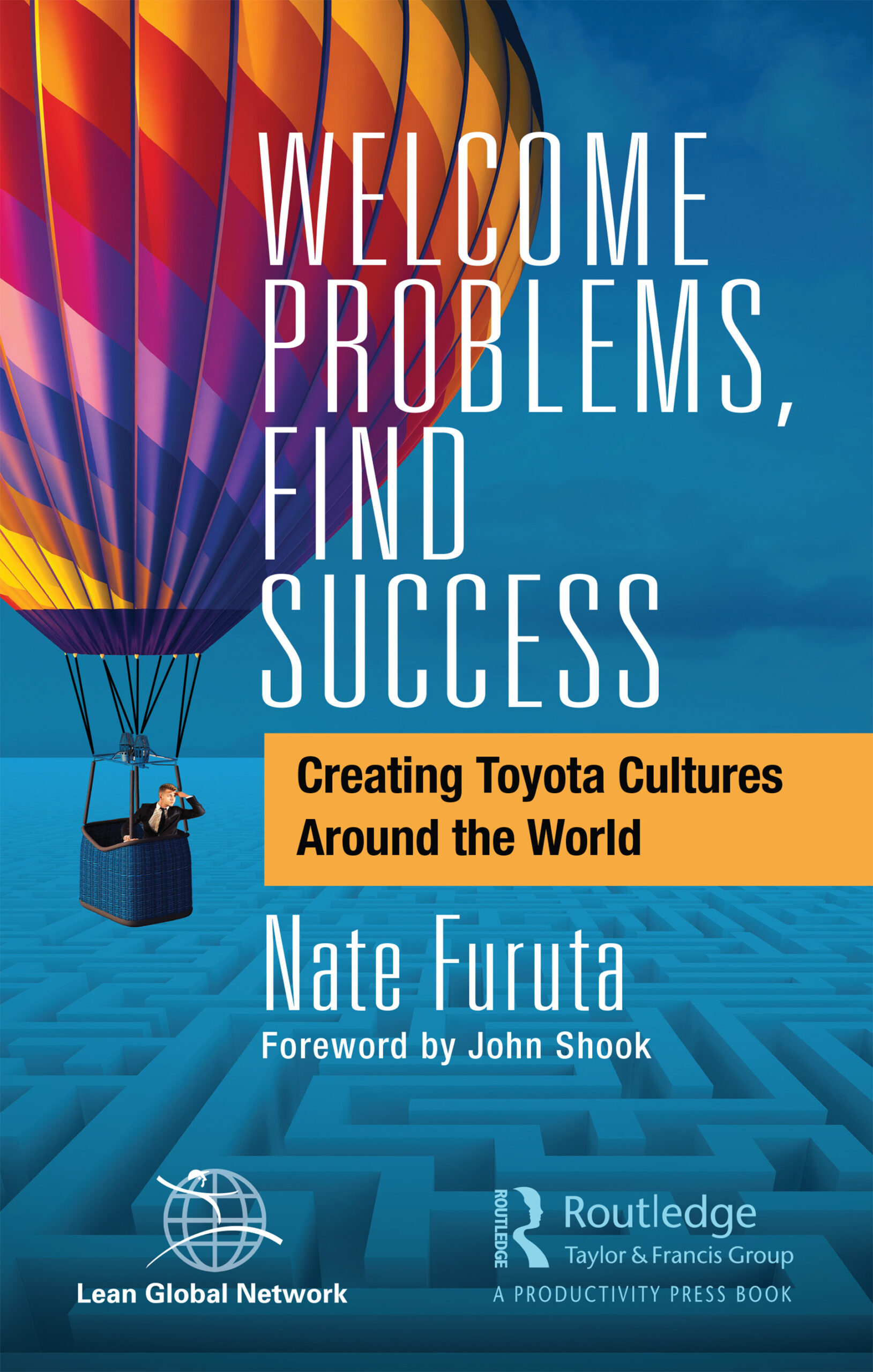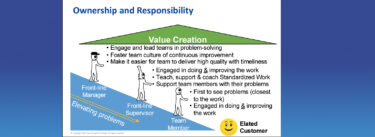In this interview with the Lean Global Network’s Planet Lean Editor Roberto Priolo, LEI Senior Lean Coach Mark Reich describes working with Kiyoshi “Nate” Furuta, author of Welcome Problems, Find Success. In the book, Furuta shares his decades of experience directly leading the establishment of Toyota cultures outside Japan.
Roberto Priolo: You were closely involved in many of the activities Furuta describes in his book, and you directly worked with him on several projects. Take us through some of them, please.
Mark Reich: Nate and I worked on a number of the same activities at a time when Toyota was hiring a ton of people to fuel its global expansion and needed an effective way to get them to interiorize the Toyota Way quickly. This is one of the things I focused on during my time working in Corporate Strategy, a function that Nate had established and run. In that area, I was tasked with deploying Management-Quality Advancement System (MAST)—which was then renamed Advancing the Toyota Way. Nate was very involved in its implementation. Our aim was to help people embrace the Toyota culture and support executives in the assessment and management of their departments and production sites.
Our aim was to help people embrace the Toyota culture…
LEI Senior Coach Mark Reich
At first, there was no North American HQ, and all North American plants were directly managed from Japan. Even after we set up Toyota Motor Manufacturing North America (TMMNA), it was never really clarified what the roles and responsibilities were—especially around HR policies. Nate was hugely supportive of my work on the Integrated Single Function program, a funky name for an initiative to define where the plants and the HQ had overlapping responsibilities.
Other fundamental initiatives Nate was instrumental for included the Plant Manager Requirements, which he developed in Japan while at the Toyota Institute, and the Toyota Business Practice (TBP)—a global program of which I was a recipient myself. TBP aimed to develop A3 problem-solving capabilities. It featured a disruptive approach to training because he set an expectation that leaders would have to pick a problem to solve, write an A3 on it, and then present it to a panel. As execs, we’d get challenged on a regular basis by the panel, and most people were asked to go back and rewrite their A3s. Soon enough, passing TBP became a condition for promotion as an exec—which says a lot about Toyota and its definition of what makes a good leader.
What would you say his main contribution was to Toyota over his 38-year career?
Nate was a bit of an unusual figure within Toyota, in that his background was in Legal and HR. He ended up being a pioneering executive, sent to tackle challenging situations in which Toyota was establishing new operations – like NUMMI, where he was responsible for leading labor negotiations with the UAW.
Essentially, his job was to take what he learned from Toyota in Japan and establish new management systems in Europe and North America.
LEI Senior Coach Mark Reich
Essentially, his job was to take what he learned from Toyota in Japan and establish new management systems in Europe and North America. We often speak of great Toyota personalities—from Mr. Cho to Ohno—but most of them were operations people. Nate helped established operations, of course, but he also played a huge role in strengthening and improving the effectiveness of the Toyota management system. In fact, the management system was his specialty! Look at the Plant Management Requirements, a learning tool for management that was based on PDCA rather than a simple checklist.
Nate was also a tireless advocate of human development within the organization, as demonstrated by the fact that he introduced TBP and set up the former Toyota Development Center to support leadership development across North America.
I’d say his work is also a powerful reminder of how Toyota solves huge problems. The Europe case study Nate shares in Chapter 3 of the book, which I first heard about during a TBP training session he ran, is a fantastic example of how you can take a very large problem and break it down into manageable chunks.
It’s interesting how Nate’s background was HR. What would you say is the role of HR in a lean transformation? In your experience as a coach, do you feel organizations are fully tapping into the potential of this department?
HR is almost never involved enough in the effort to transform organizations, even though they are absolutely critical to any initiative a business can put in place to develop people. When talking about lean turnarounds, we tend to focus on leadership and operations. Indeed, my experience with the HR department in many companies—and this was true in Toyota, too, at first—is that their role is limited to establishing policies on things like recruiting or payroll and that they are hardly ever given responsibility in human and organizational development.
Nate put a lot of effort into our HQ’s HR function…
LEI Senior Coach Mark Reich
As we defined our vision at TMMNA, the company was growing very fast and hiring many people—which challenged HR significantly. That meant we needed to develop people fast, and Nate put a lot of effort into our HQ’s HR function to strengthen their capabilities so that the right execs would get promoted to run the organization successfully. It’s a great example of how HR can be leveraged to advance a transformation.
What can you tell us about working with him directly as a person?
I remember Nate as a very outspoken and opinionated person. He could be tough, but he was also a very good coach and a strong advocate for people development. When he was aligned with your thinking, he was a big supporter. And, of course, coming from Legal, he could argue a point very effectively!
Who do you think will benefit the most from reading this book?
Top executives in any organization can benefit hugely from reading this book. The examples Nate shares are very inspirational. At the same time, I feel like sharing a little piece of advice: this book speaks of a company that’s already great and of very sophisticated systems. Readers shouldn’t be discouraged by that. Instead, I encourage them to take this book as an example of what their companies can become if they truly put people development and problem-solving at the heart of everything they do.
Banner photo of Kiyoshi “Nate” Furuta, courtesy of Automotive News.






